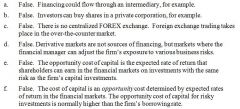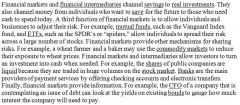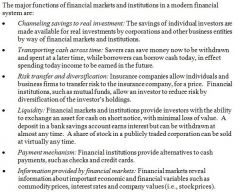![]()
![]()
![]()
Use LEFT and RIGHT arrow keys to navigate between flashcards;
Use UP and DOWN arrow keys to flip the card;
H to show hint;
A reads text to speech;
20 Cards in this Set
- Front
- Back
|
Corporate Financing. How can a small, private firm finance its capital investments? Give two or three examples of financing sources. |
The story of Apple Computer provides three examples offinancing sources: equity investments by the founders of the company, tradecredit from suppliers, and investments by venture capitalists. Other sources include reinvested earnings ofthe company and loans from banks and other financial institutions. |
|
|
Financial Markets. The stock and bond markets are not the only financial markets. Give two or three additional examples. |

|
|

|

|
|

|
a) Investor A buys shares in a mutual fund, which buyspart of a new stock issue by a rapidly growing software company. b) InvestorB buys shares issued by the Bank of New York, which lends money to a regionaldepartment store chain. c) Investor C buys part of a new stock issueby the Regional Life Insurance Company, which invests in corporate bonds issuedby Neighborhood Refineries, Inc. |
|
|
Financial Intermediaries. You are a beginning investor with only $5,000 in savings. How can you achieve a widely diversified portfolio at reasonable cost? |
Buyshares in a mutual fund. Mutual fundspool savings from many individual investors and then invest in a diversifiedportfolio of securities. Each individualinvestor then owns a proportionate share of the mutual fund’s portfolio |
|
|
Financial Intermediaries. Is an insurance company also a financial intermediary? How does the insurance company channel savings to corporate investment? |
Yes, an insurance company is a financialintermediary. Insurance companies sellpolicies and then invest part of the proceeds in corporate bonds and stocks andin direct loans to corporations. Thereturns from these investments help pay for losses incurred by policyholders. |
|
|
Corporate Financing. Choose the most appropriate term to complete each sentence. a. Households hold a greater percentage of (corporate equities / corporate bonds). b. (Pension funds / Banks) are major investors in corporate equities. c. (Investment banks / Commercial banks) raise money from depositors and make loans to individuals and businesses. |
a. Equities.As a percentage of all investors, households are the largest investor in equities. b. Pensionfunds. Banks own almost no corporateequities, but instead rely on fixed- income investments. c. Commercialbanks. In contrast, investment banks raise money for corporations. |
|
|
Financial Markets. Which of the following are financial markets? a. NASDAQ b. Vanguard Explorer Fund c. JPMorgan Chase d. Chicago Mercantile Exchange |
NASDAQand The Chicago Mercantile Exchange are financial markets |
|
|
Financial Intermediaries. True or false? a. Exchange traded funds are hedge funds that can be bought and sold on the stock exchange. b. Hedge funds provide small investors with low-cost diversification. c. The sale of policies is a source of financing for insurance companies. d. In defined-contribution pension plans, the pension pot depends on the rate of return earned on the contributions by the employer and employee. |

|
|
|
Liquidity. Securities traded in active financial markets are liquid assets. Explain why liquidity is important to individual investors and to mutual funds. |
Liquidity is important because investors want to beable to convert their investments into cash quickly and easily when it becomesnecessary or desirable to do so. Shouldpersonal circumstances or investment considerations lead an investor toconclude that it is desirable to sell a particular investment, the investorprefers to be able to sell the investment quickly and at a price that does notrequire a significant discount from market value. Liquidityis also important to mutual funds. Whenthe mutual fund’s shareholders want to redeem their shares, the mutual fund isoften forced to sell its securities. Inorder to maintain liquidity for its shareholders, the mutual fund requiresliquid securities. |
|
|
Liquidity. Bank deposits are liquid; you can withdraw money on demand. How can the bank provide this liquidity and at the same time make illiquid loans to businesses? |
Thekey to the bank’s ability to provide liquidity to depositors is the bank’sability to pool relatively small deposits from many investors into large,illiquid loans to corporate borrowers. Awithdrawal by any one depositor can be satisfied from any of a number ofsources, including new deposits, repayments of other loans made by the bank,bank reserves, and the bank’s debt and equity financingvel���MD�� |
|
|
Financial Institutions. Summarize the differences between a commercial bank and an investment bank. |
Commercial banks accept deposits and provide financingprimarily for businesses. Investmentbanks do not accept deposits and do not loan money to businesses andindividuals. Investment banks may makebridge loans as temporary financing for a takeover or acquisition. In addition, investment banks trade manydifferent financial contracts, such as bonds and options, while providinginvestment advice and portfolio management for institutional and individualinvestors. |
|
|
Mutual Funds. Why are mutual funds called financial intermediaries? Why does it make sense for an individual to invest her savings in a mutual fund rather than directly in financial markets? |
Mutualfunds collect money from small investors and invest the money in corporatestocks or bonds, thus channeling savings from investors to corporations. For individuals, the advantages of mutualfunds are diversification, professional investment management, and recordkeeping |
|

|

|
|
|
Financial Markets and Intermediaries. List the major functions of financial markets and intermediaries in a modern financial system. |

|
|
|
Functions of Financial Markets. On a mountain trek, you discover a 6-ounce gold nugget. A friend offers to pay you $2,500 for it. How do you check whether this is a fair price? |
The market price of gold can be observed fromtransactions in commodity markets. Forexample, gold is traded on the COMEX division of the New York MercantileExchange. Look up the price of gold and compare it to $2,500/6 = $416.67 perounce. |
|
|
Functions of Financial Markets. What kinds of useful information can a financial manager obtain from financial markets? Give examples. |

|
|

|

|
|
|
The Financial Crisis. True or false? a. The financial crisis was largely caused by banks taking large positions in the options and futures markets. b. The prime cause of the financial crisis was an expansion in bank lending for the overheated commercial real estate market. c. Many subprime mortgages were packaged together by banks for resale. d. The crisis could have been much more serious if the government had not stepped in to rescue Merrill Lynch and Lehman Brothers. e. The crisis in the eurozone finally ended when other eurozone countries and the IMF provided a massive bailout package to stop Greece from defaulting on its debts. |
a. False. Thefinancial crisis had its roots in an easy monetary policy that provided funds for banks to expand the supply ofsubprime mortgages to low-income borrowers. b. False. Subprimemortgages are for residential properties. c. False. Whilesubprime mortgages were packaged into mortgage-backed securities that could beresold, most were held by banks on their own books or sold to other banks. d. False. The government arranged for Bank of America totake over Merrill but did nothing to rescue Lehman Brothers, which filed forbankruptcy protection. e. False. Thoughthe massive bailout of Greece calmed the markets somewhat, concerns over Greeceand other weak eurozone countries, such as Portugal, Italy, Spain, and evenIreland, remain today. |
|
|
The Financial Crisis. What were the causes of the financial crisis? We mentioned several. Can you suggest others that we have not identified? |
Answers will vary. Causes of financial crisis included in the text are the easy monetarypolicy of the Federal Reserve, incorrect credit ratings of mortgage bonds, andagency problems with bank managers. |

